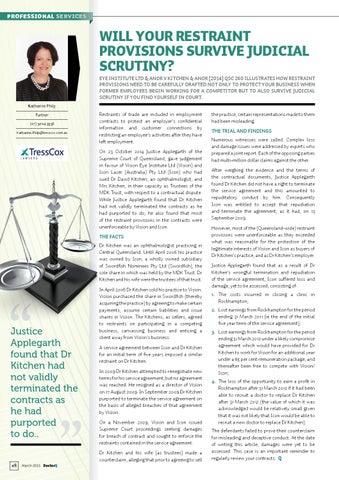professional services
Will your restraint provisions survive judicial scrutiny?
Eye Institute Ltd & Anor v Kitchen & Anor [2014] QSC 260 illustrates how restraint provisions need to be carefully drafted not only to protect your business when former employees begin working for a competitor but to also survive judicial scrutiny if you find yourself in Court. Katharine Philp Partner (07) 3004 3536 Katharine_Philp@tresscox.com.au
Restraints of trade are included in employment contracts to protect an employer’s confidential information and customer connections by restricting an employee’s activities after they have left employment. On 23 October 2014 Justice Applegarth of the Supreme Court of Queensland, gave judgement in favour of Vision Eye Institute Ltd (Vision) and Icon Laser (Australia) Pty Ltd (Icon) who had sued Dr David Kitchen, an ophthalmologist, and Mrs Kitchen, in their capacity as Trustees of the MDK Trust, with respect to a contractual dispute. While Justice Applegarth found that Dr Kitchen had not validly terminated the contracts as he had purported to do, he also found that most of the restraint provisions in the contracts were unenforceable by Vision and Icon. The Facts Dr Kitchen was an ophthalmologist practicing in Central Queensland. Until April 2006 his practice was owned by Icon, a wholly owned subsidiary of Swordfish Nominees Pty Ltd (Swordfish), the sole share in which was held by the MDK Trust. Dr Kitchen and his wife were the trustees of that trust.
Justice Applegarth found that Dr Kitchen had not validly terminated the contracts as he had purported to do.. 48
In April 2006 Dr Kitchen sold his practice to Vision. Vision purchased the share in Swordfish (thereby acquiring the practice) by agreeing to make certain payments, assume certain liabilities and issue shares in Vision. The Kitchens, as sellers, agreed to restraints on participating in a competing business, canvassing business and enticing a client away from Vision’s business. A service agreement between Icon and Dr Kitchen for an initial term of five years imposed a similar restraint on Dr Kitchen. In 2009 Dr Kitchen attempted to renegotiate new terms for his service agreement, but no agreement was reached. He resigned as a director of Vision on 17 August 2009. In September 2009 Dr Kitchen purported to terminate the service agreement on the basis of alleged breaches of that agreement by Vision. On 4 November 2009, Vision and Icon issued Supreme Court proceedings seeking damages for breach of contract and sought to enforce the restraints contained in the service agreement. Dr Kitchen and his wife (as trustees) made a counterclaim, alleging that prior to agreeing to sell
March 2015 DoctorQ
the practice, certain representations made to them had been misleading. The Trial and Findings Numerous witnesses were called. Complex loss and damage issues were addressed by experts who prepared a joint report. Each of the opposing parties had multi-million dollar claims against the other. After weighing the evidence and the terms of the contractual documents, Justice Applegarth found Dr Kitchen did not have a right to terminate the service agreement and this amounted to repuditatory conduct by him. Consequently Icon was entitled to accept that repudiation and terminate the agreement, as it had, on 13 September 2009. However, most of the (Queensland-wide) restraint provisions were unenforceable as they exceeded what was reasonable for the protection of the legitimate interests of Vision and Icon as buyers of Dr Kitchen’s practice, and as Dr Kitchen’s employer. Justice Applegarth found that as a result of Dr Kitchen’s wrongful termination and repudiation of the service agreement, Icon suffered loss and damage, yet to be assessed, consisting of: 1. The costs incurred in closing a clinic in Rockhampton; 2. Lost earnings from Rockhampton for the period ending 31 March 2011 (ie the end of the initial five year term of the service agreement); 3. Lost earnings from Rockhampton for the period ending 31 March 2012 under a likely compromise agreement which would have provided for Dr Kitchen to work for Vision for an additional year under a 65 per cent remuneration package, and thereafter been free to compete with Vision/ Icon; 4. The loss of the opportunity to earn a profit in Rockhampton after 31 March 2012 if it had been able to recruit a doctor to replace Dr Kitchen after 31 March 2012 (the value of which it was acknowledged would be relatively small given that it was not likely that Icon would be able to recruit a new doctor to replace Dr Kitchen). The defendants failed to prove their counterclaim for misleading and deceptive conduct. At the date of writing this article, damages were yet to be assessed. This case is an important reminder to regularly review your contracts. Q
